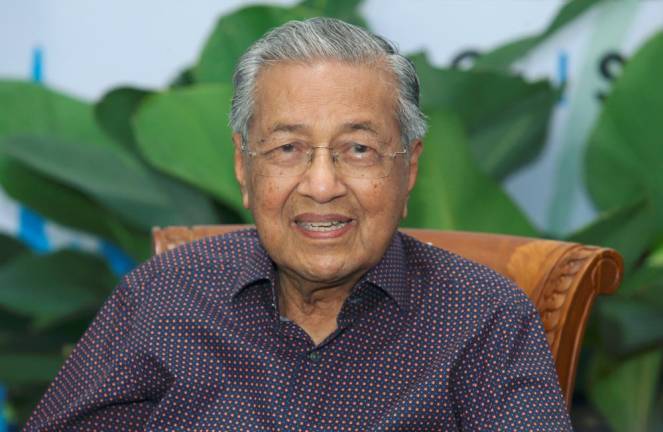
KUALA LUMPUR – Hosting a summit of Muslim leaders, Malaysia’s Prime Minister Mahathir Mohamad bemoaned the state of Islam and defended the meeting that has been shunned by Saudi Arabia and criticised for undermining the bigger Organisation of Islamic Cooperation (OIC).
Divisions in the Muslim world were self-evident as only about 20 countries, considered progressive, were invited to the Kuala Lumpur summit, even as Saudi dominated OIC comprises of 57 member countries.
The Saudi king’s criticism, and the late withdrawal of Pakistani premier Imran Khan from the event under Saudi pressure had left the hosts scrambling to soothe sensitive relations.
In welcoming remarks, Mahathir said the Kuala Lumpur Summit was meant to understand why Islam, the Muslims and their countries were “in a state of crisis, helpless and unworthy of this great religion”.
It was unclear to what extent the leaders would discuss major geo-political crises afflicting the Muslim world, ranging from the age-old disputes in the Middle East and Kashmir, to the conflicts in Syria and Yemen, through to the plight of Rohingya Muslims in Myanmar and the persecution of Uighur Muslims in China’s Xinjiang region.
Mahathir said the summit, which will end on Saturday, should address the world’s perceptions of Islam, the rise of Islamophobia, the decline of the Islamic civilisation and reforms in governance needed by Muslim nations.
“We are not discriminating or isolating anyone,” he said in his welcome speech, watched on by leaders including Turkish President Tayyip Erdogan, Iranian President Hassan Rouhani and Qatari Emir Sheikh Tamim bin Hamid Al-Thani.
“We are attempting to start small and if these ideas, proposals and solutions are acceptable and prove workable, then we hope to take it up to the larger platform for consideration.
Not a single developed Muslim country
Dr Mahathir said that not a single Muslim country is considered developed despite their immense wealth.
“They are all weak and incapable of protecting the Muslim ummah, even if it is their duty by their religion,” he said in his keynote address.
“If we care to honestly assess our situation, we must admit that we and our religion have become the subject of much vilification and defamation.”
Mahathir said Muslims and Islam had been equated with terrorism and government failures, acts of irrationality and those unworthy of civilised behaviour.
Adding that Muslim countries are accused of authoritarianism and lacking concern for human rights, he said Muslims could accuse the non-Muslim world of being biased and unjust in their assessments.
“But we cannot deny the facts that there are fratricidal wars in several Muslim countries, that many are beholden to the powerful non-Muslim nations, that Muslims are running away from their own countries to seek refuge in non-Muslim countries,” he said.
He added that Muslims are largely dependent on non-Muslims for many of their needs, to the point where they are unable to equip themselves with the means to ward off attacks by others.
“We depend on our detractors to supply us,” he said, adding that this was a far cry from circumstances in the 15th century when Muslims made advancements in science and engineering, especially the manufacturing of goods.
“But not now.”
On Islamophobia, Mahathir said Muslims were prepared to die to protect Islam and their fellow Muslims, and that some in fact were dying.
“But we have done more damage to our religion by our disreputable acts of terror,” he added.
Under European colonisation, he said, Muslims had lost their countries.
“From this decline, they have not recovered, even after regaining their independence.”
If nothing changed, he said, Muslims would continue to be oppressed and their decline would deepen.
He also said that Muslims could no longer isolate themselves as society has changed.
“No country may remain peopled by 100% Muslims now,” he said. “Other religions, other values, other ways of life affect us even if they do not live among us.”
Turkey’s President Tayyip Erdogan struck a similar tone.
“We will have the opportunity to talk freely about our issues, from Islamophobia to terrorism, divisions, internal fights ravaging our region, and sectarian and ethnic conflicts,” Erdogan told the summit.
The OIC had said it was against the interests of the Islamic community to convene meetings outside the Saudi-based organisation, which has for decades been accused of acting like a mute spectator to the Muslim sufferings the world over.
Leaders attending the Kuala Lumpur summit notable among them Erdogan and Rouhani besides Mahathir have been frustrated by the OIC’s past record of hand-wringing and failure to take firm action in support of Muslim causes.
Without mentioning the OIC by name, Erdogan said the biggest problem that platforms bringing the Islamic world together faced was a lack of implementation.
He observed that the biggest problem facing Muslims on a global scale is the lack of implementation on joint policies as Muslim nations remain fragmented and is plagued by sectarianism.
At the same time, Erdogan pointed out that the Islamic world is not weak, powerless or desperate as it has the same amount of economic resources, raw materials, population numbers and geographical location when compared to non-Muslim states.
“If the majority of Muslims are still struggling with hunger, famine, poverty and ignorance in spite of all the facilities, oil, population and natural resources that Allah has bestowed upon us, we must first look for the mistake in ourselves.
Some analysts suspect that Saudi Arabia criticism stemmed from fear of being diplomatically isolated by regional rivals Iran, Qatar and Turkey, all of whom are attending the summit.
Worried about taking sides, Pakistan’s Prime Minister Imran Khan opted to stay away from the Kuala Lumpur summit.



